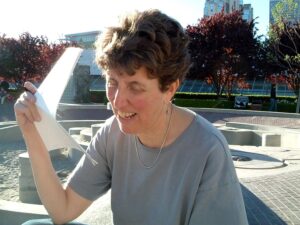Civil rights lawyer and legal scholar Julie Shapiro, a longtime summer resident of Truro, died at her home in Seattle on March 12, 2024 after a lifelong fight with Marfan Syndrome. She was 68.

She specialized in police misconduct cases and pioneered the use of the federal RICO statute to protect abortion clinics. She taught family law, civil procedure, and law and sexuality at Seattle University Law School for more than 30 years.
Julie was born in New York City on Sept. 10, 1955 to Irving Shapiro, a high school physics teacher, and Hope Shapiro, a stay-at-home mother active in her community. She grew up in Montclair, N.J. Despite being diagnosed with both Marfan Syndrome and scoliosis, which rendered her legally blind and physically restricted, Julie was a brilliant student, graduating from College High School in Montclair in 1973.
Her high school was staffed by the faculty at Montclair State College, and admission was selective, based on exams, recommendations, and interviews. Julie’s experience there was “a bit chaotic,” said her daughter, Leah McClintock-Shapiro. The college had decided to close the school, which it did in 1973, when Julie graduated in a class of eight.
She studied mathematics at Wesleyan University in Middletown, Conn., where she was a member of the Gamelan Ensemble performing Javanese music. “She had fond memories of Wesleyan,” Leah said. She graduated in 1977 and moved to Washington, D.C. to work as a lobbyist for social justice causes.
She decamped to law school at the University of Pennsylvania, where she was associate editor of UPenn Law Review; she received her J.D. magna cum laude in 1982 and went on to clerk for U.S. District Court Judge Joseph S. Lord III.
She pursued police brutality cases in the firm she established in 1984 with colleagues Holly Maguigan, Leslie Engle, and Edmond Tiryak. In 1987, Julie set up practice on her own, continuing to work on police cases in addition to AIDS discrimination cases. Her public service was recognized by the AIDS Law Project and Lambda Legal Defense and Education Fund in 1991.
“Julie was very good at what she did,” said Leah. “But she was modest and did not understand how good she was.” After 10 years of successful law practice, in which she had won substantial compensation for African-American victims of police brutality in Philadelphia, she left Philadelphia to join the law faculty at the University of Puget Sound (now Seattle University School of Law) in 1991.
As a law professor, Julie “was brilliant and thoughtful,” wrote Dean Deborah Ahrens in an online remembrance. “She made you really consider varying perspectives and also feel seen and respected — she possessed a formidable but fundamentally kind intellect.”
Outside the classroom, Julie assisted the Northwest Women’s Law Center in lesbian and gay family law cases, including In re L.B., which established the rights of de facto parents in the state of Washington, and Andersen v. King County, the case that challenged Washington’s Defense of Marriage Act. For her efforts, she was corecipient in 2006 of the first Queer of the Year Award given by Outlaws, Seattle University Law School’s LGBTQ student organization.
When Julie left Philadelphia for Tacoma, Megan McClintock, her life partner and professor of history at the University of Washington, joined her. The couple had two children using IVF: Eli McClintock-Shapiro of Oakland, Calif., a law student at the University of California, in 1995 and Leah of Boston, an event planner at Brandeis University and a Jobi Pottery painter in Truro, in 1999. Megan died in 2000.
After three years as a single mother, Julie met Shelly Cohen. The couple married after same-sex marriage became legal in Washington state in 2012.
Julie’s father loved the Outer Cape, and when she was growing up he rented the Rose Cottage on Ryder Pond in Truro for their summer vacations. He later bought a house on Great Pond in Truro, to which Julie returned throughout her life. She was welcomed by the summer community her father had helped establish, beginning with chance encounters while clamming, and that she extended over the years through the growth of the Truro Farmers’ Market and her support of Sustainable CAPE.
“Julie felt very connected to the Outer Cape landscape,” Leah said. “It provided her with a unique sense of peace.” As a kid, Julie loved walking the Truro fire roads and on Old King’s Highway, where she would walk years later with her daughter.
Julie built communities everywhere she went, Leah said: “She had friends all over the world. And she was enormously generous with her love for the Cape. She brought her circles together there. Her house had an open door to anyone who wanted to visit.”
She is survived by her daughter, Leah, her son, Eli, and her wife, Shelly Cohen of Seattle.
In lieu of flowers, donations can be made in Julie’s memory to Temple Beth Am, 2632 NE 80th St., Seattle, WA 98115, the Pride Foundation, or the National Center for Lesbian Rights.
Editor’s note: An earlier version of this obituary, published in print on March 21, misspelled the name of Julie Shapiro’s wife. It is Shelly, not “Shelley,” Cohen.



